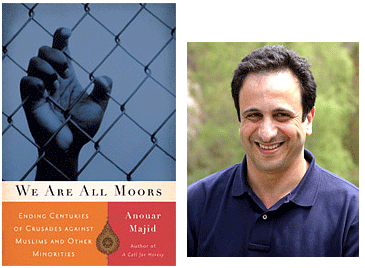
[Note: The latest book by Anouar Majid, We Are All Moors: Ending Centuries of Crusades against Muslims and Other Minorities (University of Minnesota Press, 2009) provides a provocative thesis, suggesting that we examine the issue of Muslim minorities in contemporary Europe through the prism of history, specifically the treatment of the Moors (los Moros) in Spain. Here is a sample of his argument (from pp. 3-4).]
Indeed, anyone watching the events unfolding in Europe and the United States in recent years cannot help but be struck by the confluence of the two overriding concerns of these two continental states: the mounting anxiety over coexisting with Muslims and the seemingly unstoppable waves of illegal and nonassimilable immigrants. All sorts of explanations have been offerd about these twin elements fueling the global crisis — bookshelves are filled with books about Islam, minorities, and questions of immigration — but no one seems to be reading the intense debate over immigration and minorities who resist assimilation as the continuation of a much older conflict, the one pitting Christendom against the world of Islam. We are often being asked to ponder “what is wrong with Islam” and “what is wrong with the West,” as if these two abstract, ideological entities suddenly bumped into each other in their travels and were jolted by the shock of discovery. The West encountered an archaic Islam stuck int he primitivism of pre-modern cultures, whereas Muslims discovered a dizzying, fast-dissolving secular West that is guided by the fleeting fantasies of materialism. All of this is by now amply documented. Yet what I propose in this book is that a secular, liberal Western culture and Islam were never really parted, that they ahve been traveling together since (at least) 1492, despite all attempts to demarcate, first, zones of Christian purity and , later, national homogeneity.
Without Islam, there would be no European identity to speak of, and no America, with all the consequences the “discovery” of this continent has entailed for the future of human civilization. By authorizing Christopher Columbus’s mission to the East via the western Atlantic route, the Spanish monarchs King Ferdinand and Queen Isabella sponsored what amounted to a crusade whose ultimate goal was nothing less than the capture of Jerusalem. Even before the Renaissance, especially during the fifteenth century, when the Moor emerged as the foil against which Europe would define itself, the vexed relationship (or confrontation) with Islam had been the primordial element int he constitution of an unconscious form of Europeanness. In his recently published history of the early encounters of Christians and Muslims in Europe, the Pulitzer Prize-winning historian David Levering Lewis shows that the term Europenses, or Europeans, was coined by Isadore Pacensis, an eighth-century Andalusian priest, to describe rthe new identity of Christians who defeated Muslim armies near Poitiers in 732. So significant was this confrontation in the formation of a sense of common European identity that early twentieth-century historians such as the French Ernest Lavisse and the German Hans Delbrück could still claim that this was the most decisive battle in the history of Europe or the West. Christendom’s conflict with Islam appeared so permanent that, as Samuel Huntington notes in The Clash of Civilizations and the Remaking of World Order (1996), the “term guerra fria [cold war] was coined by thirteenth century Spaniards to describe their ‘uneasy coexistence’ with Muslims in the Mediterranean.” Islam, in other words, whether in medieval Christendom or int he secular West, has consistently maintained its troubling strangeness, Its specter has never vacated the West’s unconscious.